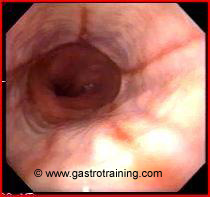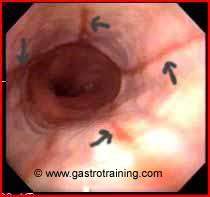Mr Gayle, a 23 old university student presents with heartburn not controlled with omeprazole 40 mgs BD. His endoscopy showed:

What is the diagnosis?
Erosive oesophagitis

Discuss the endoscopic grading for severity of oesophagitis?
The severity of erosive oesophagitis on endoscopy is usually graded using the Los Angeles classification:
Grade A- One or more mucosal breaks no longer than 5 mm, none of which extends between the tops of the mucosal folds
Grade B- One or more mucosal breaks more than 5 mm long, none of which extends between the tops of two mucosal folds
Grade C- Mucosal breaks that extend between the tops of two or more mucosal folds, but which involve less than 75% of the oesophageal circumference
Grade D-Mucosal breaks which involve at least 75% of the oesophageal circumference
What is the role of endoscopy?
Endoscopy is a poor diagnostic test. Most patients (>50%) with GORD have no visible evidence of oesophagitis at endoscopy, making endoscopic appearance a poor guide to diagnosis and management of GORD. Further, the correlation between endoscopy findings and symptom severity is poor.
Endoscopy may be requested in patients with:
- Symptoms unresolved by PPI as in the current case
- Presence of alarm features like vomiting, gastrointestinal bleeding or anaemia, abdominal masses or unexplained weight loss, and progressive dysphagia
Discuss your management of Mr Gayle i.e. a patient with GORD and non response to twice daily PPI?
Step 1- Check compliance. Exclude contributory causes like alendronate, NSAIDS, KCL, doxycycline etc
Step 2- Consider other diagnoses:
- Look for skin changes- some skin diseases can affect oesophagus like epidermolysis bullosa acquisita, bullous pemphigoid, cicatricial pemphigoid and lichen planus. Lichen planus of oesophagus present with nodules. The diagnosis may be difficult as the skin disease may not be active when their oesophageal disease is problematic. Oesophageal biopsy from the uninvolved areas usually helps in the diagnosis. These patients require very aggressive immunosuppressive therapy.
- Zollinger Ellison Syndrome (ZES)- about 60% patients with ZES will have associated oesophageal complaints.
- Functional heartburn- A normal 24 hr pH study in the presence of symptoms raises the possibility
Eosinophilic oesophagitis should also be considered in the absence of erosive oesophagitis
What are the indications for antireflux surgery?
- Regurgitation-dominant or volume related reflux symptoms (although there is no proven superiority for surgery for this indication)
- Persistent or recurrent symptoms despite PPI therapy
- Dissatisfaction at continuing long term PPI
- Poor compliance (for example due to costs of PPI)
- Presence of large hiatus hernia
Discuss HP eradication and GORD?
There is a negative association between the prevalence of H pylori and GORD, but the nature of this relationship is uncertain.
- H pylori eradication does not affect the outcome of PPI treatment in patients with GORD in Western populations.
- Routine testing for H pylori is not recommended in GORD.
- HP testing should be considered in patients receiving long term maintenance treatment with PPIs. Profound acid suppression affects the pattern and distribution of gastritis favouring corpus dominant gastritis. It may accelerate the process of loss of specialised glands, leading to atrophic gastritis and potentially, gastric cancer. H pylori eradication halts the progression of atrophic gastritis and may lead to regression of atrophy. The effect on intestinal metaplasia is uncertain.
(The prevalence of H pylori in patients with GORD is lower than in those without reflux disease. Falling prevalence of H pylori infection in developed countries has been paralleled by an increase in GORD and its complications. The nature of this negative association is unclear. The prevalence of H pylori infection was reported to be lower in patients with Barrett’s oesophagus and adenocarcinoma of the cardia. This association has been confirmed in most but not all studies).
Further reading






